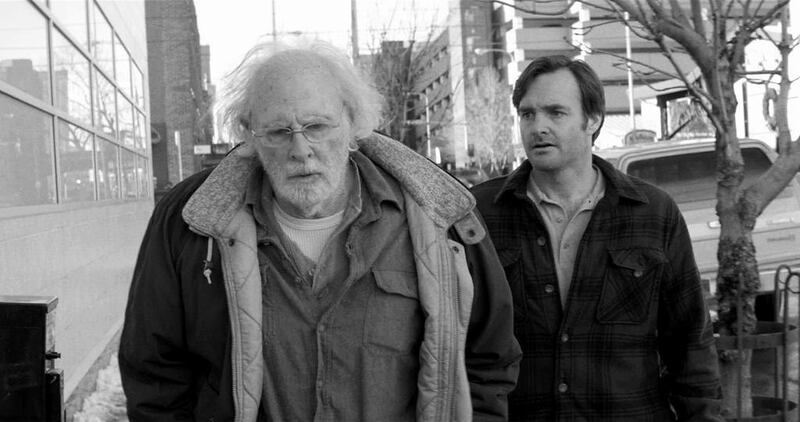Bruce Dern might be playing an ornery alcoholic with incipient dementia and bad hearing, who is reaching the end of life's road, in Alexander Payne's bittersweet new film, Nebraska, but the veteran actor insists that he is only just getting going.
“This is a business about endurance,” he says after the film’s world premiere in Cannes. “I’ve run, I don’t know, 300 marathons, and nobody starts racing until we’ve all done 16 miles. Well, let’s just say I’m in my 17th/18th mile, so I’m ready to race.”
At 77, Dern has been directed by Alfred Hitchcock, Douglas Trumbull, Sydney Pollack, Quentin Tarantino, Hal Ashby, to name a few. His performance as an unhinged Vietnam vet in the latter's Coming Home earned him his only Oscar nomination. ("There's others where I was better where I never came near, because people never saw the movies a lot of times.") Many now expect him to garner his second for Nebraska.
This would certainly make him luckier than Woody, who trustingly hits the road — accompanied by his son, endearingly played by the Saturday Night Live alumnus Will Forte — to collect a cash prize that everyone else knows is a scam. Woody's about two things, says Dern: "He's about tell it like it is and fairness. He just expects that. And in Nebraska and other places like that in America, it isn't fair any more."
Dern sees Nebraska as somewhere that’s both economically depressed and forgotten about. This, he believes, is why Payne — who comes from Omaha and has made three previous films in his home state, but never in the rural area before — fought hard to shoot the movie in black and white. “Nebraska is a place where it is black and white,” says Dern. “There is colour in the people, if you take the time to examine them, but it’s over in Nebraska.”
Paramount was worried that eschewing colour would hit sales, but Payne stood his ground. Dern admires and respects the 52-year-old director of films such as Sideways and About Schmidt. He "dares to dream", he says, like Ashby or Bob Rafelson, who made the classic The King of Marvin Gardens, in which Dern starred opposite his pal Jack Nicholson. They helped to define American cinema in the sixties and seventiess, but were eventually crushed by the system.
“The business battered their brains out,” Dern says sharply. “And Alexander doesn’t let it. As far as I am concerned, he is six for six.” The garrulous septuagenarian sees himself and Payne as carrying on the work of filmmakers who were fascinated by people. “The reason Alexander’s wonderful is he’s not afraid to study behaviour with the camera,” he says. “What’s really going on is why he makes movies and why I make movies. I think this is the best film I have been in and, I think, the best work I have done.”
Nebraska is about Woody and his family and acquaintances; but it's also about people who've been left behind — by the country and by film-makers — and about a kind of American filmmaking that has got almost completely lost in the age of comic-book blockbusters.
"Remembrances of things past, that's who I am and that's what Alexander is," says Dern, echoing the melancholy wistfulness of Nebraska. "These people [in Nebraska and places like it], they trusted, they believed, they were fair — why not make a movie about them? They're the fabric of the country I live in but nobody pays any attention to them because they don't give a s***. We made this for the people that don't give a s***."
Nebraska screens at Madinat Theatre on Thursday, December 12 at 9.30 PM
artslife@thenational.ae





